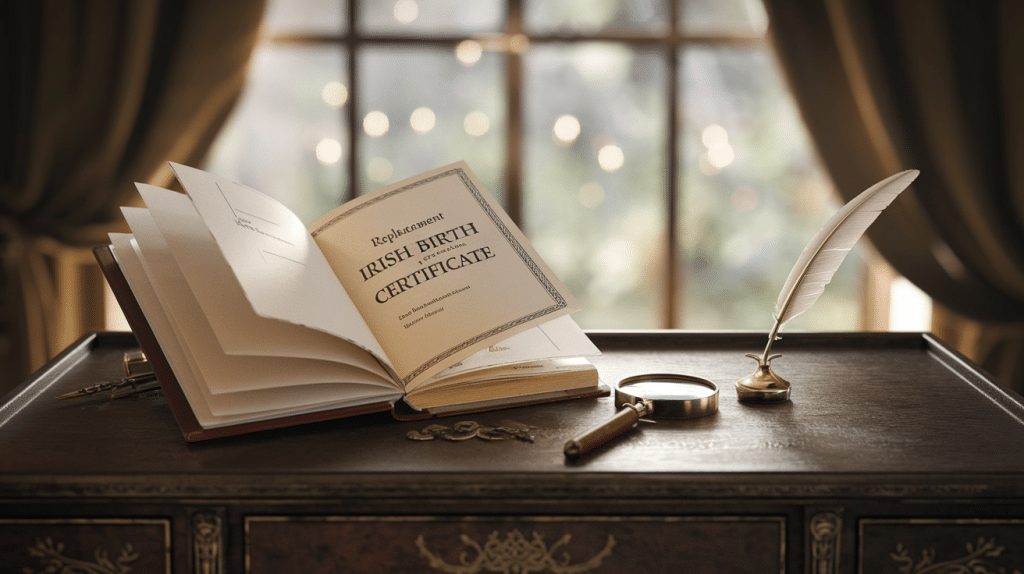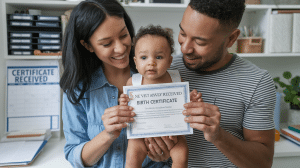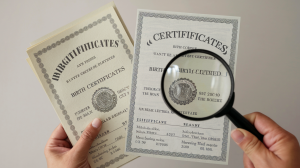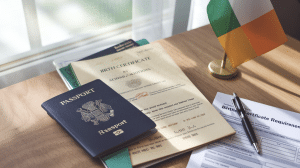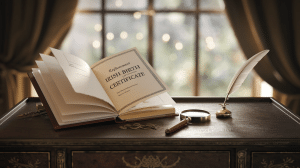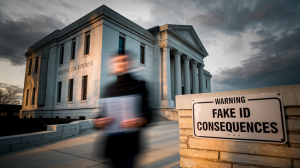Have you ever found yourself in a situation where you desperately needed your Irish birth certificate, only to realize it’s nowhere to be found? 😱 Whether you’re applying for a passport, tracing your family history, or handling legal matters, a missing birth certificate can throw a wrench in your plans. But don’t panic just yet!
The good news is that replacing an Irish birth certificate is not as daunting as it might seem. In fact, with the digital age upon us, you might be wondering, “Can I obtain a replacement Irish birth certificate online?” 🤔 This question, along with other crucial aspects of birth record retrieval, is exactly what we’ll explore in this comprehensive guide.
From Scottish records to Irish archives, we’ll navigate through the maze of genealogical resources and official channels. We’ll also provide you with further reading materials, related research guides, and even video tutorials to ensure you have all the tools at your disposal. So, let’s embark on this journey to uncover the secrets of replacing your Irish birth certificate and unlock the doors to your heritage! 🍀🔑
Irish Birth Certificate: Scottish records
A. Statutory registers and parish registers (1553–2009)
Scottish records offer a wealth of genealogical information through statutory registers and parish registers. These records span from 1553 to 2009, providing a comprehensive historical account of births, marriages, and deaths in Scotland.
| Record Type | Time Period | Information Contained |
|---|---|---|
| Parish Registers | 1553-1854 | Baptisms, marriages, burials |
| Statutory Registers | 1855-2009 | Births, marriages, deaths |
Parish registers, maintained by the Church of Scotland, are invaluable for research prior to 1855. Statutory registers, introduced in 1855, offer more detailed information and are maintained by the government.
B. Births, baptisms and marriages (before 1880)
For records before 1880, researchers must rely heavily on parish registers. These documents provide:
- Names of individuals
- Dates of events
- Sometimes, occupations and residences
Key points to remember:
- Not all parishes have complete records
- Information may vary in detail and accuracy
- Some records may be in Scots or Latin
C. Birth, marriage and death certificates (from 1855)
The introduction of civil registration in 1855 marked a significant improvement in record-keeping. These certificates offer:
- Full names of individuals
- Dates and places of events
- Parents’ names and occupations
- Witnesses to marriages
Researchers can access these records through:
- ScotlandsPeople website
- Local registrar offices
- National Records of Scotland in Edinburgh
Understanding these different record types is crucial for anyone seeking to trace their Scottish ancestry or obtain replacement certificates.
Can I obtain a replacement Irish birth certificate online?

You can obtain a replacement Irish birth certificate online through the General Register Office’s website. The process is straightforward and convenient, allowing you to request and receive your certificate without visiting an office in person. Simply fill out the online application form, pay the required fee, and your replacement birth certificate will be delivered to your specified address.
Irish records
Northern Irish birth, marriage and death registers and certificates
In Northern Ireland, civil registration of births, marriages, and deaths began in 1864. These records are maintained by the General Register Office of Northern Ireland (GRONI). Here’s a breakdown of the available records:
| Record Type | Start Date | Availability |
|---|---|---|
| Births | 1864 | Online/Office |
| Marriages | 1845 | Online/Office |
| Deaths | 1864 | Online/Office |
To obtain a replacement Irish birth certificate from Northern Ireland:
- Visit the GRONI website
- Use their online search facility
- Order a certified copy for a fee
Indexes to and registers of civil records of births, marriages and deaths (mid-19th to mid-20th centuries) in Ireland
For records in the Republic of Ireland, the General Register Office (GRO) maintains indexes and registers. These records cover:
- Births from 1864
- Marriages from 1845 (non-Catholic) and 1864 (all)
- Deaths from 1864
Indexes are available online through various genealogy websites, while full registers can be accessed at the GRO research room in Dublin.
Birth, marriage and death certificates (from 1864) for Ireland
To obtain a replacement birth certificate for Ireland:
- Determine the registration district
- Gather necessary information (full name, date of birth, parents’ names)
- Contact the appropriate registrar’s office
- Pay the required fee
Transcriptions of birth, marriage and death records
Many genealogical societies and websites offer transcriptions of Irish vital records. These can be helpful when:
- Official records are difficult to read
- You need quick access to information
- Searching for patterns in family history
However, always verify transcriptions against official records when possible.
Now that we’ve covered Irish records, let’s explore some additional resources for further research.
Further reading
Further Reading
To deepen your understanding of Irish birth certificates and related topics, consider exploring the following resources:
- Books:
- “Tracing Your Irish Ancestors” by John Grenham
- “Irish Records: Sources for Family and Local History” by James G. Ryan
- Online Resources:
- Irish Genealogy (www.irishgenealogy.ie)
- National Archives of Ireland (www.nationalarchives.ie)
- General Register Office (www.gov.ie/en/organisation/general-register-office/)
Here’s a comparison of some key resources:
| Resource | Type | Coverage | Access |
|---|---|---|---|
| Irish Genealogy | Online Database | Various records, including births | Free |
| National Archives | Online and Physical Archive | Historical records | Mostly free |
| General Register Office | Government Office | Official birth records | Paid service |
For those interested in broader Irish genealogy research:
- Join local genealogical societies
- Attend Irish genealogy workshops and conferences
- Subscribe to Irish genealogy magazines or newsletters
These resources will provide valuable insights into obtaining replacement Irish birth certificates and conducting thorough genealogical research. As you explore these materials, you’ll gain a deeper appreciation for Irish historical records and their significance in tracing family histories.
Related research guides
Adoptions
Adoption records can provide valuable insights for those seeking information about their birth families or adopted children. In Ireland, adoption records are handled differently than standard birth certificates. Here’s a brief overview:
- Pre-1952 adoptions: Informal, with limited official records
- Post-1952 adoptions: Regulated by the Adoption Authority of Ireland
- Access to records: Restricted due to privacy concerns
Births, marriages and deaths at sea or abroad
For Irish citizens born, married, or deceased outside Ireland, including at sea, special registration processes apply:
| Event Type | Registration Process |
|---|---|
| Births | Foreign Birth Registration |
| Marriages | Recorded in Foreign Marriages Register |
| Deaths | Recorded in Register of Deaths Abroad |
Births, marriages and deaths in England and Wales
While separate from Irish records, events in England and Wales may be relevant for those with Irish ancestry:
- General Register Office (GRO) maintains these records
- Online indexes available for searching
- Certificates can be ordered for a fee
Births, marriages and deaths in the armed forces
Irish citizens serving in armed forces may have events recorded differently:
- Army registers: Separate records for births, marriages, and deaths
- Naval records: Often included in regular civil registration
- Air Force records: Similar to army, with separate registers
Census records
Census records provide valuable context for birth certificate research:
- Ireland censuses:
- 1901 and 1911 censuses available online
- Earlier censuses largely destroyed
- UK censuses:
- May include Irish individuals living in Britain
- Available from 1841 to 1921 (1921 for England and Wales only)
Now that we’ve explored these related research guides, let’s move on to some helpful video resources that can further assist in your search for a replacement Irish birth certificate.
Related video guides
A. Ordering documents
When it comes to obtaining a replacement Irish birth certificate, understanding the process of ordering documents is crucial. Here’s a breakdown of the key steps:
- Identify the correct authority
- Gather required information
- Choose the ordering method
- Pay the necessary fees
- Wait for processing and delivery
| Step | Description |
|---|---|
| 1. Identify authority | General Register Office (GRO) for Ireland |
| 2. Required information | Full name, date of birth, place of birth, parents’ names |
| 3. Ordering methods | Online, by post, or in person |
| 4. Fees | Vary based on certificate type and delivery method |
| 5. Processing time | Typically 5-10 working days |
B. Preparing to research
Before embarking on your quest for a replacement Irish birth certificate, proper preparation is key. Consider the following:
- Gather all available family information
- Check family records and documents
- Consult with older family members
- Create a research plan
- Familiarize yourself with Irish genealogy resources
C. The life of a document
Understanding the journey of an Irish birth certificate can provide valuable insights:
- Creation: Recorded at local registrar’s office
- Storage: Transferred to General Register Office
- Preservation: Digitized and archived
- Access: Made available for official requests and genealogical research
This knowledge can help you appreciate the importance of these documents and the care taken in their management. As we move forward, we’ll explore related research guides that can further assist you in your quest for a replacement Irish birth certificate.
Obtaining a replacement Irish birth certificate is a straightforward process that can be done online, making it convenient for those living abroad or unable to visit in person. Whether you’re researching Scottish or Irish records, the digitalization of these documents has made genealogical research more accessible than ever before.
Remember that birth certificates are essential for various purposes, from tracing your family history to proving your identity for legal matters. If you need further assistance, consult the related research guides and video tutorials available. These resources can provide valuable insights and step-by-step instructions to help you navigate the process of obtaining your replacement Irish birth certificate with ease.

